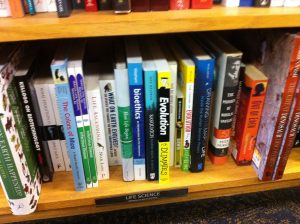 Yesterday I was browsing in a bookshop the many shelves of books about evolution (or “life sciences” — but most books were about evolution). I was slightly amazed how many of those books were scholarly publications that their cover blurbs explained were addressing Creationists or Intelligent Design proponents. Every one of those that I opened up was a serious, respectful, direct and fact-based book explaining the evidence for evolution and addressing Creationist’s objections and arguments. All were written by scientists.
Yesterday I was browsing in a bookshop the many shelves of books about evolution (or “life sciences” — but most books were about evolution). I was slightly amazed how many of those books were scholarly publications that their cover blurbs explained were addressing Creationists or Intelligent Design proponents. Every one of those that I opened up was a serious, respectful, direct and fact-based book explaining the evidence for evolution and addressing Creationist’s objections and arguments. All were written by scientists.
Not one was a ridiculing or derisively putting down Creationists or their arguments.
Now I believe that Creationist arguments should not be taught in public schools. I am sure most of those scientist authors would believe the same. But it was obvious that they also believed that those arguments “deserved to be heard”. Why else would they write respectful books about them?
It is one thing to exclude certain arguments and speech from forums marked off for certain purposes that exclude that form of speech for justifiable reasons. It is quite another to say someone who is not inciting harm or invading privacy and such does not deserve to be heard. (It is also obviously legitimate to speak out strongly against ideas that we do believe to be harmful.)
Having just caught up with McGrath’s recent post, I should be clear and let it be known that I am very sure that not all scientists are always so tolerant and civil in their approach to Creationism. But fortunately in the “free market of books and ideas”, the jerks were not published and on the shelf for sale. At least not in Borders’ Singapore’s Orchard Road branch.
At the same time I have no reason to think that even those who publish respectful books are always the model of decorum, even in private company, when the topic is raised. But that’s fine. Farting is always best kept private.
I can’t speak for others, but one reason I think that even arguments, for example, about alien abductions and Atlantis and even Christianity “deserve to be heard” is because they are very often sincerely entertained by my brothers and sisters, fellow humans. It’s about respect and simply trying to be a decent human getting along with others as vulnerable as myself. I was introduced to Enlightenment literature when quite young and I still feel attached to the idea of hearing people out and sharing what I can with them and respecting them enough to continue with their own journey. And always — literally always — in the back of my mind is how wrong I have been before when I was so sure I was right, and how tentative human knowledge and understanding have always been.
Thus when people bring up the topic of alien abductions I am able to share with them my experience with sleep paralysis, and how during those years, being religious, I then understood the experience described today by some “alien abductees” to be demonic. In the case of the talk of Atlantis, I am able to share my knowledge of the history of the idea itself and origin as a myth.
Probably most of us who have had the benefit of more education than others, or some experiences that have enabled insights from uncommon perspectives, feel our lives are more worthwhile if we can give back to the community, to others, something of what we have gained. It’s all about sharing experiences and ideas and trusting enough people to make the more justifiable choices and responses.
I tend to think of creationists as being the ones who do the ridiculing and play the avoidance games and latch on to side-irrelevancies (sophistry), and of the scientists being the ones who engage in a serious, direct, respectful, evidence-based argument.


